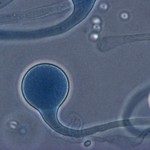Link to Pubmed [PMID] – 21308551
Curr Infect Dis Rep 2010 Nov;12(6):430-6
The polymerase chain reaction (PCR) methods published for the diagnosis of invasive fungal infections are still not included in the revised European Organization for Research and Treatment of Cancer/Invasive Fungal Infections Cooperative Group and the National Institute of Allergy and Infectious Diseases Mycoses Study Group (EORTC/MSG) Consensus Group definitions of IA. This could be achieved with consensual PCR procedures. A checklist of items has been proposed to improve the reliability of the results and clinicians’ confidence in them, with emphasis on limiting false-positive results from contamination with either previously amplified products or environmental commensals. Internal amplification controls are mandatory to expose false-negative results. However, our ignorance of the origin and the kinetics of fungal DNA during an infection hamper the choice of the best specimen and DNA extraction protocol. Evidence is increasing that serum could be a good compromise between sensitivity and ease of DNA extraction. Once a technical consensus is achieved, clinical studies should be initiated to integrate quantitative PCR in the diagnostic armamentarium.

